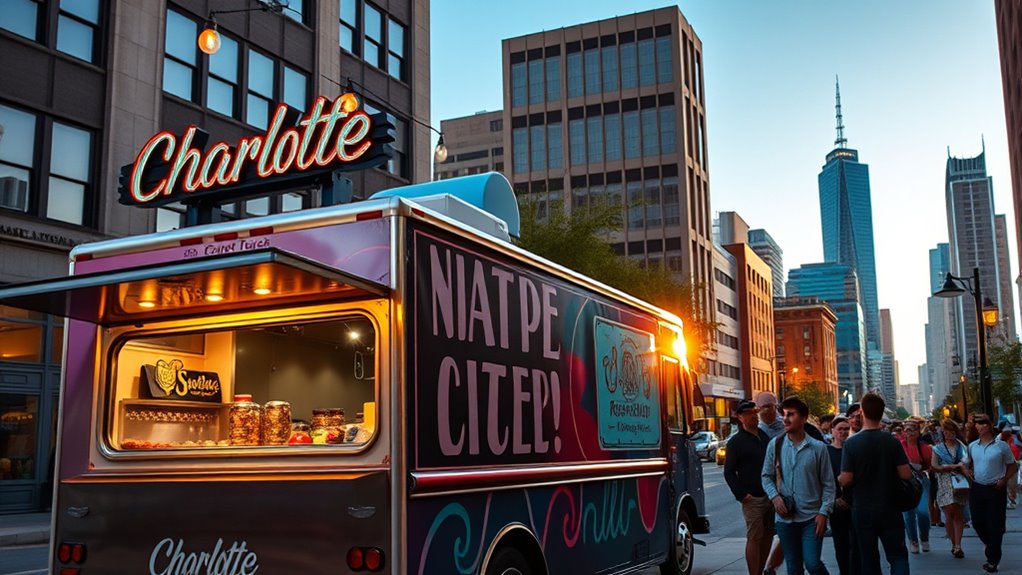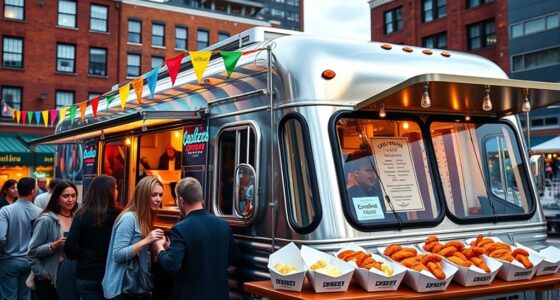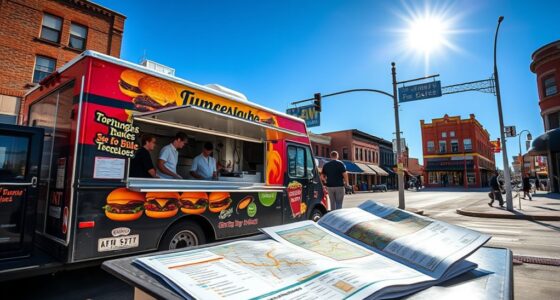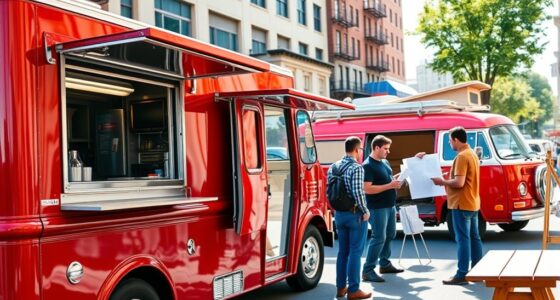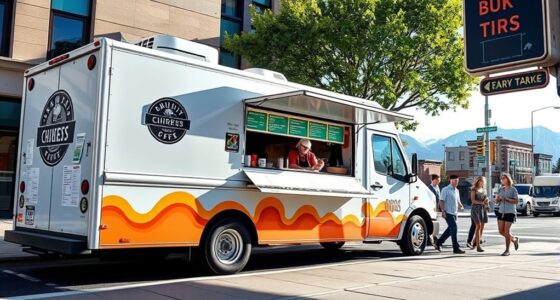To open a food truck in Charlotte, you’ll need permits from the county health department, city zoning, and possibly a food vending license, which can cost around $175 annually. Expect startup expenses for equipment, vehicle outfitting, and insurance. Choose prime private property locations compliant with zoning rules, especially in business districts. Develop a safe, appealing menu that follows North Carolina food regulations. For tips on permits, costs, locations, menu ideas, and marketing strategies, continue exploring those details here.
Key Takeaways
- Obtain necessary permits including Mobile Food Unit, Zoning, and Health Department approvals, with costs around $150–$175 annually.
- Secure a suitable private property location within designated zoning districts, adhering to distance and site plan requirements.
- Develop a compliant menu using approved ingredients, maintain proper food safety practices, and use an approved commissary kitchen.
- Budget for equipment, vehicle modifications, insurance, permit fees, and ongoing operational expenses.
- Implement effective marketing strategies through branding, social media, community engagement, and location selection for visibility and compliance.
Navigating Permits and Licenses in Charlotte
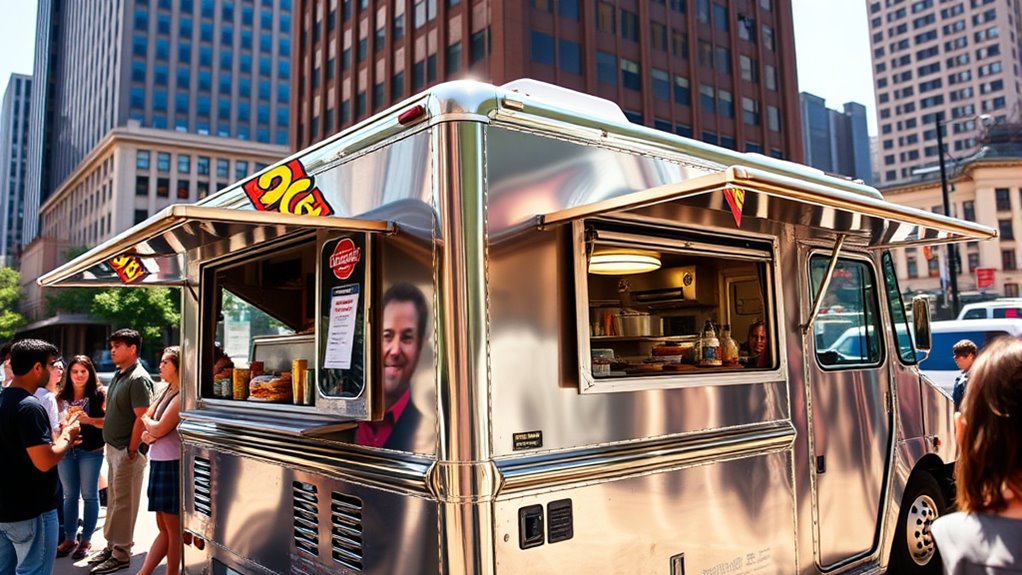
Managing permits and licenses in Charlotte can seem complex, but understanding the requirements is essential for your food truck’s legal operation. First, you’ll need a Mobile Food Unit Permit from the Mecklenburg County Health Department, which requires passing an inspection. You’ll also need a Zoning Permit from the City of Charlotte, costing $175 per property, valid for a year, obtained through the Code Enforcement Division. Depending on your location, a Wake/Mecklenburg County Food Vending Permit might be necessary, along with a North Carolina Department of Agriculture Food Permit for certain food categories. Additionally, securing a Sales and Use Certificate ensures tax compliance. Prepare to submit applications, proof of insurance, and vehicle documentation. Keep in mind that permits often need renewal annually, and changing locations or commissaries may involve extra fees and paperwork. Local regulations may also require compliance with specific health and safety standards, which can vary depending on your food truck’s menu and operational setup. Being aware of food safety standards and maintaining proper documentation will help ensure a smooth approval process.
Estimating Startup and Operating Expenses

Understanding your startup and operating costs is vital to launching your food truck in Charlotte. You’ll need to budget for licensing, equipment, and vehicle expenses, as well as insurance and other miscellaneous fees. Carefully estimating these costs helps guarantee your business stays financially healthy from the start. Additionally, considering the popularity of mobile food options like Frozen Yogurt, which can be a profitable addition to your menu, might enhance your offerings and attract more customers.
Licensing and Permits
Starting a food truck in Charlotte requires obtaining several permits and licenses that add to your initial and ongoing expenses. You’ll need a Mobile Food Unit Operating Permit from Mecklenburg County Health Department, costing about $150 annually. The property owner must also secure a Zoning Permit from the City of Charlotte, roughly $175 per year. You must submit proof of a compliant commissary kitchen and vehicle registration documentation. Additionally, most vendors need a Certificate of Insurance, often naming Charlotte Center City Partners as additionally insured for event participation. Licensing authorities include the Mecklenburg County Health Department and City Code Enforcement. You’ll also need to renew permits yearly and stay compliant with health, noise, signage, and waste regulations. These permits ensure your operation is legal, safe, and ready to serve customers. Given the increasing popularity of food trucks in Charlotte, permits and licenses are expanding rapidly in the city.
Equipment and Vehicle Costs
Launching a food truck in Charlotte involves significant equipment and vehicle costs that can vary widely based on your choices. You might spend between $50,000 and $175,000 on the truck itself, depending on whether it’s new, used, or custom-built. Custom outfitting for kitchen and service needs can add around $45,000 for appliances and layout. Your decision to buy or lease impacts upfront expenses and ongoing costs. Fuel type and truck size influence operating costs, with electric conversions gaining popularity to reduce fuel expenses. Vehicles must meet health and safety standards, affecting modifications and appliances. Visualize your investment with these elements:
- Custom-built or pre-owned truck
- Kitchen appliances and fixtures
- Fuel type and retrofit costs
- Health and safety modifications
- Branding and signage integration considering local regulations will help ensure compliance and avoid costly modifications later. Additionally, understanding equipment costs and how they impact your startup budget can help you plan more effectively.
Insurance and Miscellaneous
Estimating your insurance and miscellaneous expenses is essential for a realistic food truck budget in Charlotte. You’ll need various policies like general liability, workers’ comp, and commercial auto insurance. Costs vary by risk, equipment value, and coverage level. Bundling policies can save money, but compare options. Additional expenses include commissary rental, permit fees, and health inspections. Insurance renewals happen annually, with potential rate changes and administrative fees. Budget for unexpected repairs, legal costs, and claims not covered by deductibles. Understanding insurance coverage options ensures comprehensive protection for your business.
Identifying Prime Locations and Zoning Requirements
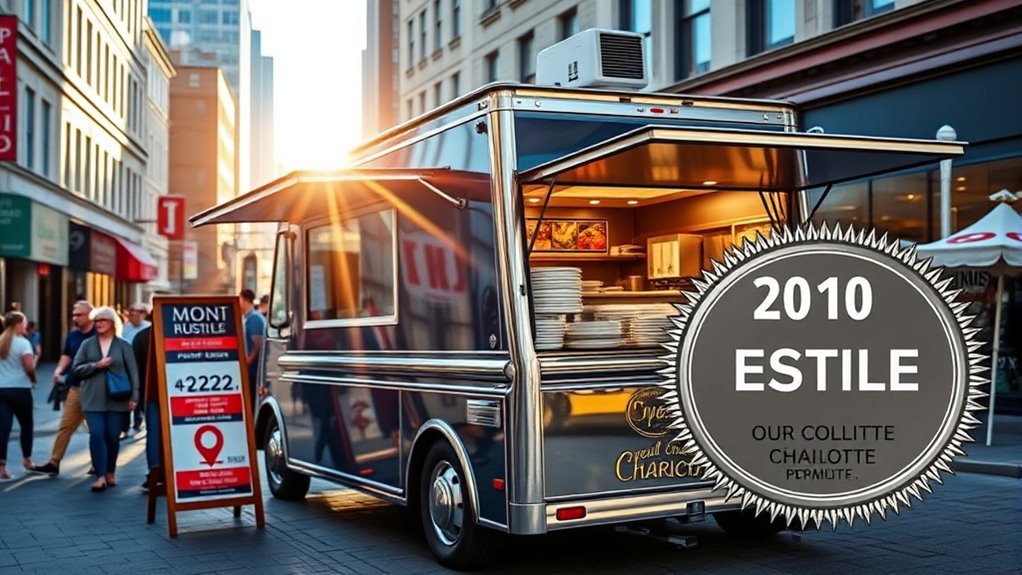
To operate your food truck in Charlotte, you need to understand which zoning districts permit mobile food vending and verify your chosen location complies with local regulations. Site plan approval is often required to confirm that your setup fits within the designated area and meets safety standards. Knowing these requirements upfront helps you select prime spots that maximize visibility while avoiding legal issues. Additionally, understanding local regulations for cultural and regional food offerings can help you tailor your menu to attract a diverse customer base.
Zoning Districts Permitted
Understanding where food trucks can operate in Charlotte starts with identifying the permitted zoning districts and locations. You’ll find Mobile Food Vendors (MFVs) allowed mainly on private property with proper zoning permits from Neighborhood Services. These trucks must stay at least 100 feet from restaurant entrances during the day and 400 feet at night to reduce competition. You can also operate within certain overlay districts like Historic District Overlays, which may have restrictions. Common prime spots include:
- Private properties outside restaurant buffers
- Non-residential local streets with easy access
- High foot-traffic areas like parks and entertainment districts
- Public right-of-way with Streetside Vending permits
- Zones with commercial kitchens for overnight storage
Zoning regulations also specify that food trucks must comply with local signage, health, and safety codes to ensure proper operation. Additionally, knowing the zoning districts helps identify the best locations for your operation and avoid violations. Ensuring your location aligns with zoning rules is essential for legal and successful operation.
Site Plan Approval
Identifying prime locations for your food truck in Charlotte requires careful site plan approval that aligns with zoning requirements. Your plan must clearly show the truck’s location, parking, pedestrian pathways, and proximity to structures. It must also specify the number of trucks allowed per site and demonstrate compliance with land use policies and access rules. Approval depends on whether the site avoids obstructing fire lanes, emergency routes, and pedestrian flow. Sites within business districts or transit areas are preferred. The review process involves city planning, code enforcement, and health departments, with timelines from weeks to over a month. Property owners need permits, often costing around $175 annually, and failure to comply can lead to fines or permit revocation. Additionally, understanding vetted regulations and guidelines can streamline the approval process and help avoid common pitfalls.
Crafting a Menu That Meets Local Standards
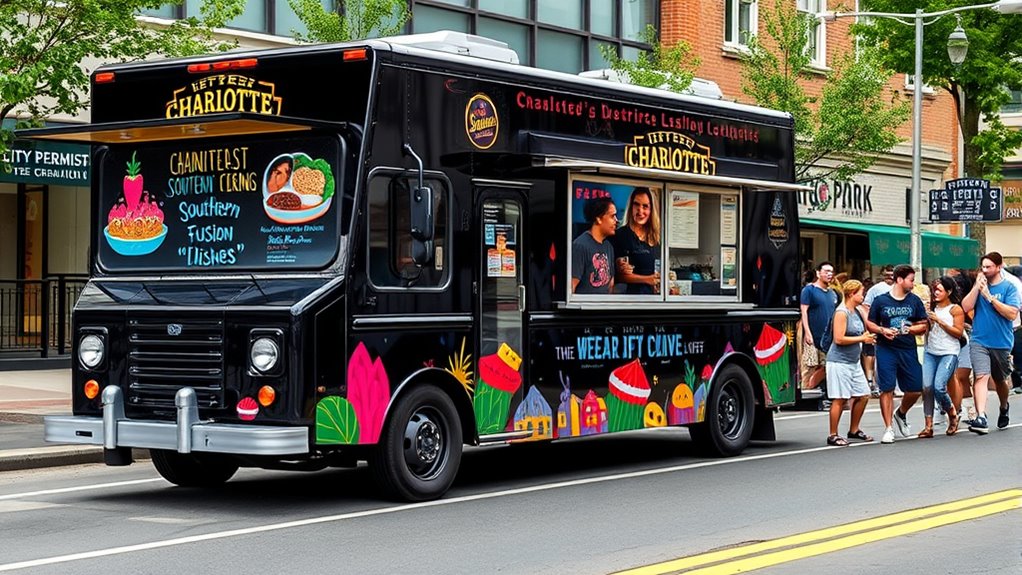
Crafting a menu that complies with Charlotte’s local standards requires careful selection of ingredients and thoughtful planning. You need to guarantee your menu items meet safety regulations and sourcing guidelines. Focus on using ingredients approved by the N.C. Department of Agriculture and follow sanitation protocols during prep and storage. Consider these key points:
- Use locally sourced, fresh produce and meats to meet freshness and safety standards
- Plan for proper cold storage for perishables, verified during inspections
- Avoid menu items that require disallowed cooking methods or equipment
- Provide clear allergen information, aligning with transparency best practices
- Guarantee menu complexity aligns with approved commissary facilities for prep and storage
- Be aware that menu items must meet licensing and health code requirements to ensure compliance with local health departments.
- Regularly review and stay updated on food safety regulations to maintain compliance and prevent violations.
Sticking to these principles helps your menu stay compliant and appealing to Charlotte’s health standards.
Developing Effective Marketing and Promotion Strategies
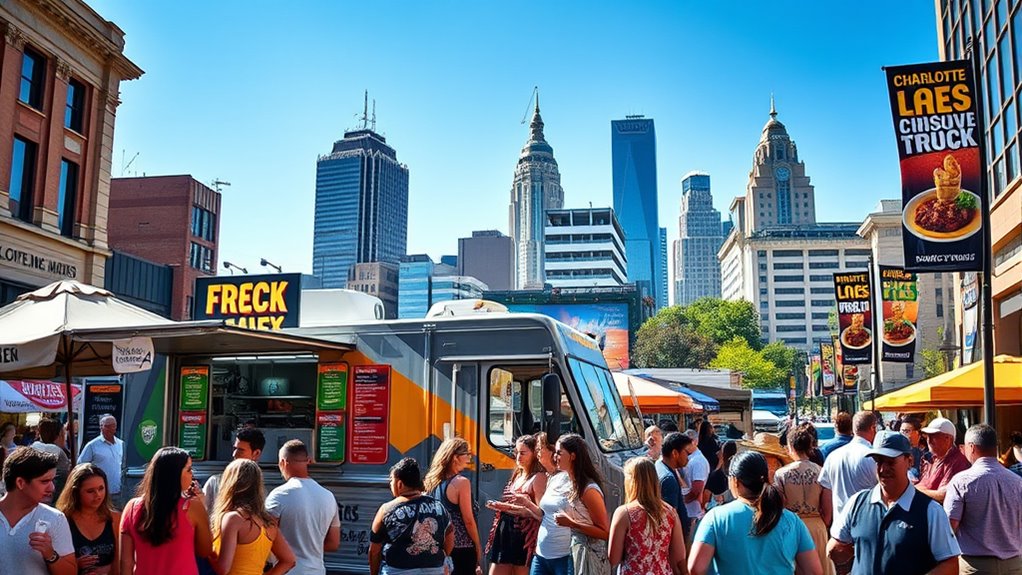
To effectively promote your food truck in Charlotte, you need a strategic mix of branding, community engagement, and online presence. Establish a distinct brand identity with consistent truck design, logos, and messaging that reflect your personality. Share a compelling story to connect emotionally and turn visitors into loyal customers. Participate in local events like festivals and markets, and partner with nearby businesses such as breweries. Use targeted advertising on social media, leverage retargeting, and encourage reviews to build trust. Maintain an appealing website with SEO optimization and active social profiles. Consider offline tactics like flyers and posters. Utilizing brand recognition strategies can significantly enhance your visibility in the local market. Use the table below to plan your promotional efforts:
| Strategy | Action Items |
|---|---|
| Brand Development | Consistent visuals, storytelling, merchandise |
| Community Engagement | Events, partnerships, exclusive menu items |
| Digital Marketing | Website, social media, targeted ads, reviews |
Ensuring Compliance and Maintaining Best Practices
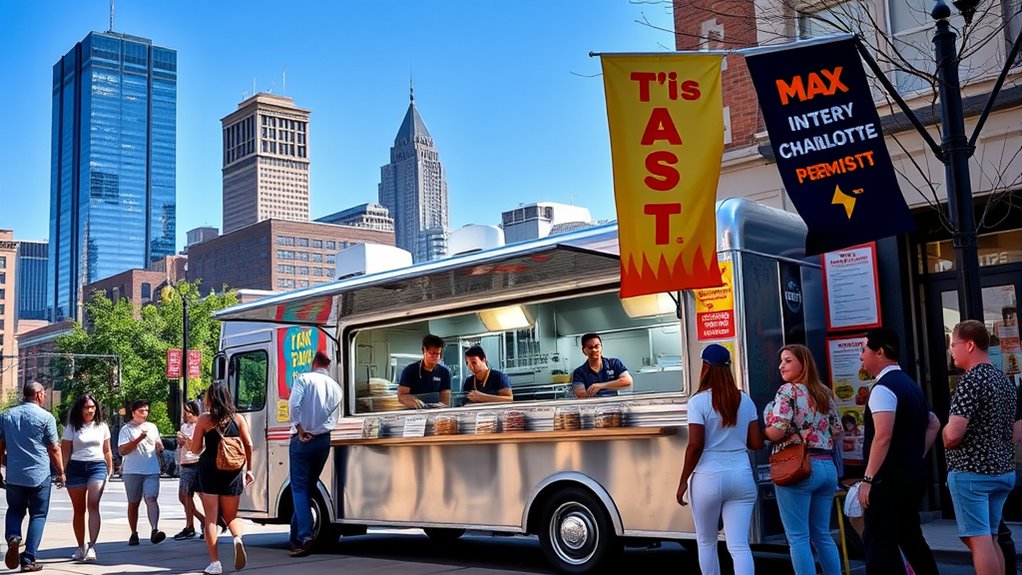
Ensuring compliance and maintaining best practices are essential steps to keep your food truck operating smoothly and legally in Charlotte. You need to use an approved commissary kitchen that meets health standards, with documented agreements approved by local authorities. Regularly clean and sanitize your truck and equipment, dispose of waste properly, and return to the commissary daily for restocking. Obtain a valid health permit from Mecklenburg County and follow North Carolina Food Code standards to prevent violations. Operate only on zoned private property with proper permits, avoiding streets and public rights-of-way. Keep your documentation, including permits, insurance, and commissary agreements, up to date. Also, train employees on food safety, record inspections, and adhere to all local regulations to avoid penalties and ensure smooth operations.
Frequently Asked Questions
How Long Does the Permit Approval Process Typically Take in Charlotte?
The permit approval process in Charlotte usually takes about 3 to 6 weeks, but it can be longer during peak seasons like spring and early summer. You’ll need to submit a complete application with all required documents, including health and insurance certificates. Keep in mind, incomplete applications or missing paperwork can delay approval by an additional 1-2 weeks. You should track your application online and stay in contact with the permitting offices.
Are There Specific Vehicle Requirements for Food Trucks in Charlotte?
They say “the devil is in the details,” and that’s true for vehicle requirements in Charlotte. You need a truck no longer than 18 feet, and it must be self-propelled—no trailers allowed. Your vehicle needs valid registration, insurance, and must meet emissions standards. Plus, it has to be approved by local authorities, operate from an approved commissary, and comply with zoning and parking rules.
Can I Operate a Food Truck on Residential Private Property?
You can’t operate a food truck on residential private property without checking zoning rules first. In Charlotte, food trucks need specific zoning permits and must follow distance and safety regulations. Usually, trucks on residential land must be in approved areas, avoid blocking driveways, and operate within set hours. Make sure to get the necessary permits and adhere to safety standards to avoid fines or impoundment.
What Are the Best Times and Events to Maximize Customer Traffic?
You want to maximize customer traffic by choosing the best times and events. Focus on lunch hours from 11 a.m. to 2 p.m., especially during weekdays in business districts or office parks. Attend community events like First Friday Festivals, weekend markets, and festivals in spring and summer. Evenings on Fridays and Saturdays are ideal at nightlife hubs or during special city events, boosting your visibility and sales.
How Do I Handle Food Waste and Sanitation in Compliance With Local Laws?
You need to handle food waste and sanitation carefully to stay compliant. Always dispose of waste in approved containers and make certain they’re emptied daily at your commissary or designated disposal site. Maintain strict handwashing practices and sanitize all surfaces regularly. Use certified equipment for cleaning and storage, and keep waste away from food prep areas to prevent contamination. Following these steps helps you meet local health regulations and keeps your operation safe.
Conclusion
Starting a food truck in Charlotte is an exciting venture, but it requires careful planning and compliance. Have you considered how each step—from permits to marketing—fits together to create your success story? By understanding local regulations, managing costs, choosing the right location, and crafting a standout menu, you’ll set yourself up for growth. Are you ready to turn your food truck dreams into reality and serve Charlotte’s hungry crowds? The journey begins now—are you prepared to take the leap?
